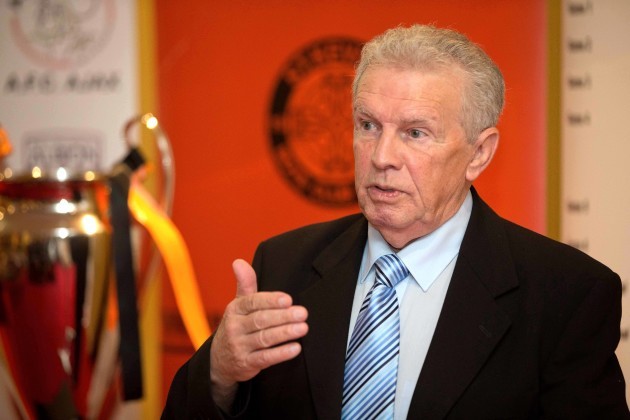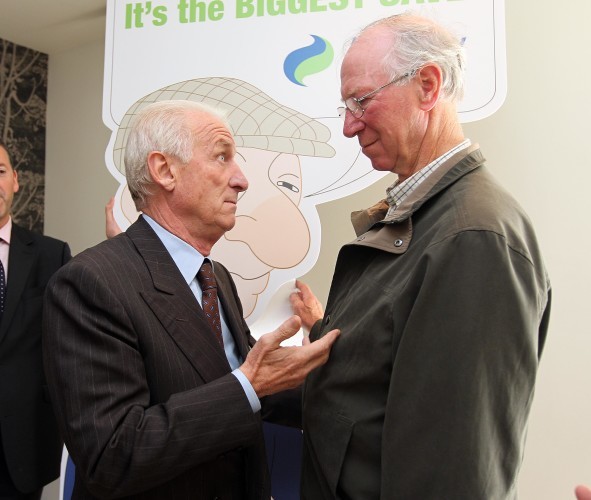Updated at 17.39
FOR THE MOST part, managerial life has not been kind to ex-Ireland coaches.
For a while, it looked as if Martin O’Neill might struggle even to find employment after leaving the Boys in Green post last November.
Having reportedly been offered the Stoke job last year while still in charge of Ireland, there was no second opportunity once the Potters hotseat became available again.
Similarly, there were other recent Premier League and Championship vacancies that O’Neill was not considered for.
It was consequently telling that last December, the experienced coach chose to sit down with a few British journalists and remind people: ”I’m not done with management yet”.
There is an element of romance that probably helped the Derry native’s chances in his pursuit of the Forest job. The ex-Northern Ireland international spent 10 years at the City Ground, with the trophies he accumulated there including a league title and two European Cups.
The club still have plenty to play for this season — they are currently ninth, and just four points off the Championship play-off spots.
Nevertheless, even for a Forest legend like O’Neill, succeeding at the City Ground will not be easy. In the past three years alone, seven managers have tried and failed to bring the glory days back to the club.
Should the 66-year-old succeed in bringing the once-great team back to the Premier League for the first time since 1999, it would be among his most impressive managerial achievements — getting Celtic to the Uefa Cup final, winning the League Cup twice with Leicester and finishing sixth three seasons on the bounce with Aston Villa among other noteworthy triumphs.
But in addition to facing an uphill task in the Championship, the omens are not especially good for O’Neill when you consider the record of past former Ireland managers.
Of all the ex-Boys in Green bosses, only his successor Mick McCarthy could be put forward as an example of someone whose adaptation to managerial life thereafter has been an unequivocal success.
There have been a few that it would be harsh to brand as managerial failures — Brian Kerr earned a few memorable results with extremely limited resources during a two-year stint in charge of Faroe Islands — but invariably, the trajectory for ex-Ireland managers has been downward.
Mick Meagan was widely regarded as the first proper Ireland manager, with a selection committee overseeing proceedings prior to the Dubliner’s appointment in 1969. After stepping down from the Ireland post in 1971, he had respective two-year spells as player-manager of Drogheda and Shamrock Rovers.
Next up was former Newcastle player and Shamrock Rovers legend Liam Tuohy.
“We used to play on a Sunday after playing in England (with our clubs) on a Saturday,”
Eoin Hand explained in a 2017 interview with The42.
“That didn’t give you much hope. You’d have played 24 hours before and you were playing against teams that were fresh, and you had travelled Saturday night to get to Dublin.
“So Liam Tuohy was the first to shift the games to Wednesday and he did a lot of work in that department. That gave us a chance.
““But then Liam resigned, I think the pressure of the job got to him.”
After leaving the Ireland job in 1973, Tuohy had a brief stint in charge of Shelbourne as well as lengthier spells with Dublin University and the Ireland U19s, though he resigned from the latter role in 1986, after feeling undermined by senior boss Jack Charlton, who allegedly came into the dressing room at half-time during one game to give instructions to the youngsters.
John Giles subsequently had a seven-year stint in charge of Ireland.
“John was ultra-professional,” Hand recalled. “So he brought a great belief and we thought, hold on a second, we can hold our own against any team if we’re organised and the preparation was the best it could be. But on the football side of things, we all knew our jobs.
“We gave it our best, so the results started to improve a lot under John.”
Giles introduced promising youngsters such as Liam Brady into the team and Ireland fell just two points short in their bid to qualify for the 1978 World Cup.
However, the Leeds legend stepped aside shortly after the team’s failure to reach the 1980 European Championships.
Giles’ time as Shamrock Rovers manager coincided with his Ireland tenure, and despite bringing through several talented young players and introducing a greater level of professionalism to the set-up, the Dubliner was not able to fulfill his grand ambitions of enabling the club to win league titles and seriously compete on the European stage. The 1978 FAI Cup was the team’s sole major trophy during that period.
After leaving Rovers in 1983, Giles spent three seasons as a coach of Vancouver Whitecaps and a year-long second stint at West Brom, before leaving football management in 1985 and pursuing a career in punditry.
His Ireland successor, Hand, came closer than anyone before him in helping the Boys in Green reach a major tournament, with the team’s dreadful misfortune, particularly in narrowly failing to qualify for the 1982 World Cup, well documented.
After leaving the Ireland job, Hand had spells in charge of Al-Taawon, Huddersfield Town, Amazulu and Shelbourne, but like Giles, he ended up increasingly working in punditry and finished up in football management after departing Shels in 1994, less than a decade after his Ireland exit.
In 10 years in charge, Charlton became Ireland’s most successful manager ever, guiding the country to two World Cups and the 1988 European Championships. Somewhat surprisingly though, that is where his managerial career ended.
Celtic and Wales were reportedly both interested in appointing Charlton after his Ireland departure, though nothing on the table compared with the allure of his last job.
The death of close friend Jock Stein also reportedly played a part in Charlton’s thinking, after the legendary manager suffered a heart attack on the bench during a 1985 Scotland-Wales World Cup qualifier. The World Cup winner feared the strain of managing into old age could lead to a similar fate.
Meanwhile, in a 2017 interview, Charlton’s biographer Colin Young told The42: “I suspect, once he had got to the age of 60, semi-retired, taking a few months or weeks off, once he got into that lifestyle again with the hunting and the fishing and the fact that it’s highly unlikely he would have had to have paid for much in Ireland after the success he had, I guess he just got sucked into retirement and very much enjoyed it. And he’s definitely one to enjoy life and not be troubled by things.”
After Charlton, McCarthy also enjoyed success with Ireland, getting them to the last-16 of the 2002 World Cup. And since leaving, he has enjoyed more memorable days, achieving promotion to the Premier League with both Sunderland and Wolves, in addition to helping a limited Ipswich squad punch above their weight in the Championship.
Brian Kerr, meanwhile, having achieved great success with Ireland as an underage coach, could not replicate these feats with the senior team. He oversaw unsuccessful qualification campaigns for Euro 2004 (where he took over from McCarthy after two games) and the 2006 World Cup. And the Faroe Islands job aside, Kerr has been largely restricted to media work ever since, despite high-profile figures such as Liam Brady calling for his return to the Irish set-up in some capacity.
Steve Staunton took over from Kerr, though a series of disappointing results, most notably the 5-2 loss in Cyprus, led to his departure from the role after just 21 months.
Since then, he has had just one managerial job, and it was similarly short-lived. He lasted less than a year in charge at Darlington, with the struggling club winning just four of his 23 league matches at the helm. Since then, Staunton has worked as a scout among other roles.
Giovanni Trapattoni helped make Ireland difficult to beat again, and after narrowly failing to achieve qualification for the 2010 World Cup, he guided the team to the 2016 Euros.
It fell apart to a degree subsequently however, with the lowlight being a 6-1 loss to the soon-to-be-world-champions Germany prior to his departure in 2013, following another failed qualification campaign.
Trap has been linked with a couple of jobs since leaving Ireland, but at 79, a return to football appears increasingly unlikely.
Whether O’Neill can succeed where Trap and others have failed in properly re-launching his managerial career post-Ireland remains to be seen, but McCarthy at least has proven in can be done.
N.B. For the purposes of concision, we’ve chosen to omit caretakers or individuals who were in charge for just one game, such as Alan Kelly Senior and Noel King, from this list.
Subscribe to our new podcast, Heineken Rugby Weekly on The42, here:



